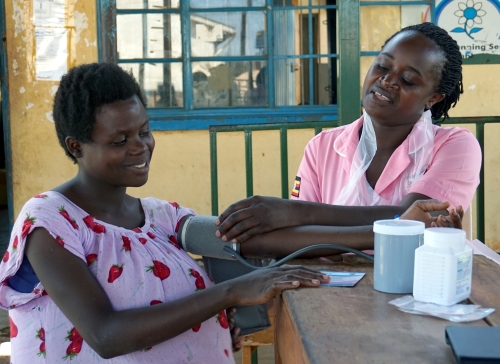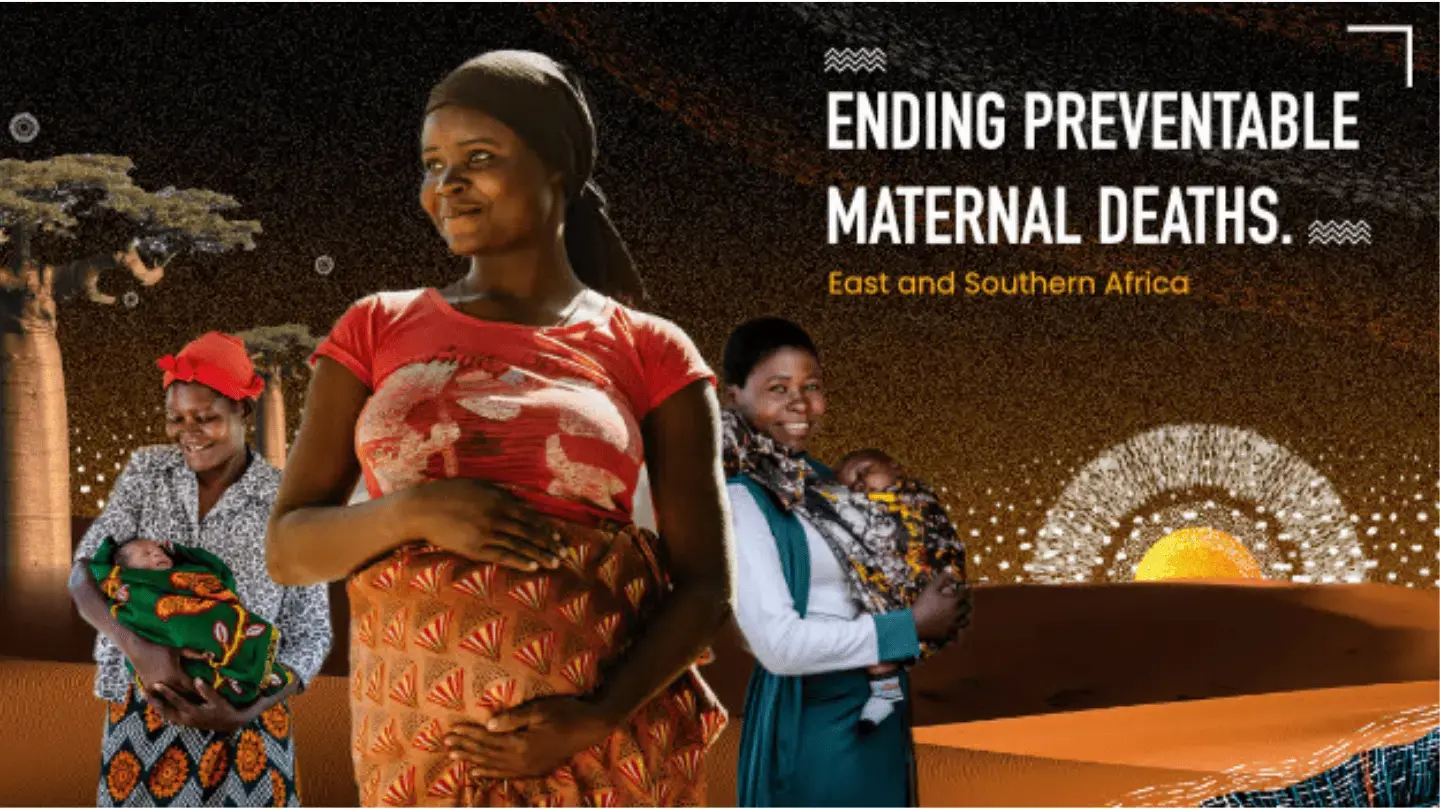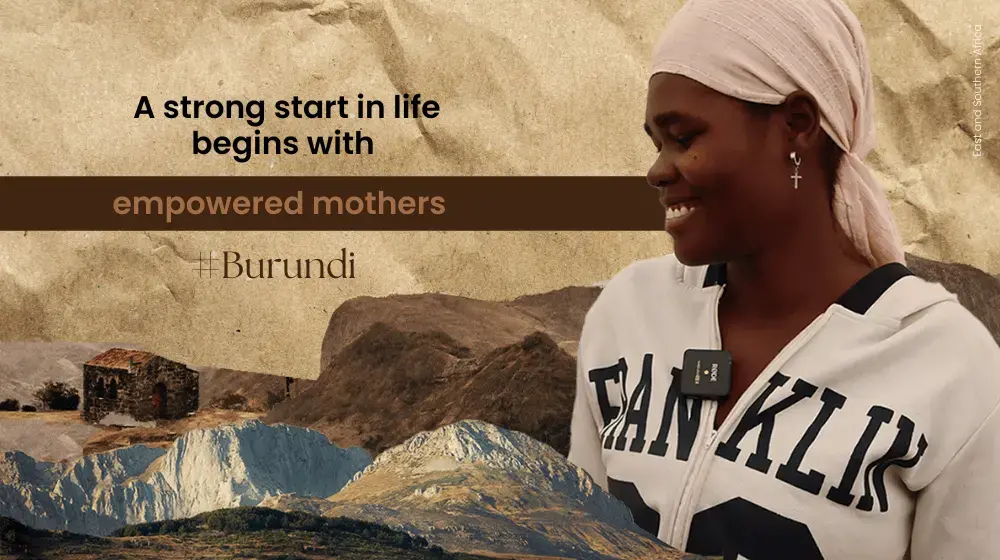KAMULI, Eastern Uganda, Uganda – Health workers at Mayuge Health Centre III were concerned that Alice Nalubwama’s labour was not progressing well. “The midwife said that my contractions were weak and that I may not be able to push the baby out. I was so worried. I didn’t know what would happen next,” she said.
Realising that she might need a Caesarean section, the health workers quickly referred her. She was taken by ambulance to the better equipped Kamuli Mission Hospital, where an emergency Caesarean section was performed.
Ordinarily, the operation would have cost her about 500,000 shillings, not counting the cost of transport to the hospital. Thanks to a new scheme supported by UNFPA, the United Nations Population Fund, Ms. Nalubwama and her family paid nothing.
I feel so happy that I was able to deliver my baby safely.

With her newborn – her fourth child – in her arms and her mother by her side, she smiled broadly as a midwife conducted a ward round to check on her and other new mothers.
Making birth safer
This may sound like a routine and ordinary event but in parts of Uganda, for women like Ms. Nalubwama, a safe birth is not a given. Even though the recently released Uganda Demographic and Health Survey (UDHS) showed that about 7 out of 10 women now deliver with the help of a skilled professional, pockets of inequality remain – especially in rural areas.
Here, having a baby is not always an easy journey and for many women the costs involved are prohibitive; many end up delivering at home or with unqualified birth attendants who cannot handle complicated deliveries.
Without skilled assistance, women run the risk of serious injury (such as obstetric fistula) and death from pregnancy or birth-related complications. With improvements in maternal health care, the number of maternal deaths in Uganda has halved in the past 25 years.1 More women are using family planning and delivering at a health facility under skilled care.
The 2016 UDHS showed that pregnancy-related deaths have declined steadily from 524 deaths per 100,000 live births in 2001, to 438 per 100,000 live births in 2011, and 368 per 100,000 live births in 2016.
“We should be proud of these achievements and work harder to sustain the gains and do even better,” said Uganda’s Health Minister, Dr. Ruth Aceng, at the launch of the UDHS Survey report in Kampala in March.
Released by the Uganda Bureau of Statistics (UBOS), it confirmed that the percentage of women receiving antenatal care from a skilled provider increased from 95 per cent in 2011 to 97 per cent in 2016. The proportion of women who gave birth at a health facility increased dramatically from 57 per cent in 2011 to 73 per cent in 2016. And the proportion of women whose births were attended by a skilled provider rose from 58 per cent in 2011 to 74 per cent in 2016.
The report also showed that 58 per cent of the total demand for family planning is being met, with 39 per cent of married women and 51 per cent of sexually active unmarried women in Uganda using a contraceptive method. This is an increase from 2011, when 24 per cent of all women (30 per cent of married women, and 52 per cent of sexually active unmarried women) were using some form of contraception.
Yet clearly, more needs to be done.
Ms. Nalubwama said she and her husband, who are peasant farmers, used up their savings on antenatal care visits for their first three children and deliveries at a private clinic near their home.
Maternal health scheme launched

To address the challenges faced by women like Ms. Nalubwama, a new initiative, the Maternal Health Voucher Scheme, was introduced. The scheme is part of the Reproductive Maternal Newborn and Child Health Country Engagement plan, implemented jointly by UNFPA, WHO and UNICEF.
One of the aims of the scheme is to ensure the availability and use of high impact maternal health interventions at birth and during the postnatal period. The people who are intended to benefit are women and men in 30 districts where maternal deaths are rife, and where access to good quality services during pregnancy and delivery is still a challenge.
In eight districts in Eastern Uganda, UNFPA supports partner Marie Stopes Uganda with implementation of the voucher scheme, which was rolled out in June 2016. The initiative has been implemented in 100 public and private health facilities that are accredited by Marie Stopes to provide maternal health services.
Training volunteer health workers
The scheme works through a network of 200 trained volunteer health workers (Village Health Teams) who are a critical link to the health system. The VHTS identify needy prospective mothers and sell them vouchers at 4,000 shillings. (About $1). They also provide information to pregnant women on the importance of attending at least four antenatal care visits and delivering at a health facility.
The voucher card allows mothers-to-be to access services throughout pregnancy and delivery, with just one single payment. Once a mother buys the voucher she is entitled to four antenatal care visits, delivery under the care of a skilled health professional and postnatal care. For women who develop complications, an ambulance is available to ensure there are no delays in getting them to a higher level facility where they can receive more specialized care.
This is precisely what happened in Ms. Nalubwama’s case.
Scheme addresses poverty
For Dr. Andrew Muleledhu, the Medical Superintendent at Kamuli Mission Hospital, the fact that Ms. Nalubwama and others like her are able to access such services is a testament to the power of the voucher scheme.
The voucher prevents mothers and their families from going into financial catastrophe simply because they are having a baby.

“At the heart of it, the voucher system is addressing poverty,” he said. “That voucher is money in the hands of the mother. It is preventing this mother and her family from going into financial catastrophe simply because they are having a baby. That is universal health coverage at its best,” he said.
Sister Jane Nelima, a midwife at Mayuge Health Centre III, one of the facilities where the Voucher Scheme operates, agreed. As a midwife she is happy that as a result of the voucher scheme, more mothers attend the antenatal care clinic and deliver at the facility.
To date, almost 2000 women in the eight districts where the voucher scheme is implemented have been supported to deliver at a health facility, where they are attended by trained and skilled health workers. Almost 15,000 vouchers have been sold, meaning that many more mothers will be receiving critical maternal health care in months to come.
For Ms. Nalubwama, the only thing that could top her experience of having a safe delivery was the thought of getting back home and introducing the new addition to the family to her husband and other children.
UNFPA’s interventions
The encouraging indicators in the 2016 UDHS are a reflection of the ongoing interventions that UNFPA – through the Government of Uganda – is undertaking to ensure provision of quality maternal health services in an equitable manner. Increasing access to emergency obstetric care, skilled birth attendance at birth, and family planning are the three indicators that UNFPA has invested in heavily to ensure that women and young people’s health is not compromised.
There has been significant improvement with UNFPA’s support. Supervised deliveries increased from 14 per cent in 2010 to 64 per cent in 2016.
In 2010, UNFPA established a programme focusing on high burden regions in Uganda and ensuring a midwife is available for every birth. The midwifery scholarship programme purposes to attract girls into midwifery as a career choice. Through bonding agreements, UNFPA established a mechanism for mentoring the newly qualified midwives who benefit from the scholarship to serve in their respective home districts at least for three years.
To date, 462 women have been trained countrywide on certificate courses and posted in the underserved Karamoja region in Eastern Uganda, where maternal health indicators were poorest. The bonding increased access to skilled care, with the midwives at the forefront of increasing access to contraceptive use, antenatal services and ensuring safe deliveries. The results are visible.
“There has been significant improvement with UNFPA’s support,” said Dr. Phillip Olinga, District Health Officer, Kotido district. “Supervised deliveries increased from 14 per cent in 2010 to 64 per cent in 2016.”
In June 2015, to enhance delivery and access to reproductive health Services, UNFPA handed over an assortment of reproductive health supplies and equipment worth more than $770,000 to the Uganda government to ensure that every woman has access to a skilled, well-equipped and motivated midwife or doctor before, during, and after her pregnancy and at childbirth.
In the eight districts of Gulu, Arua, Napak, Nakapiripirit, Bundibudyo, Abim, Amudat and Kitgum, 95 health centres benefit from this support. It consists of delivery beds, delivery sets, hospital beds, Caesarean sets, stretchers, screens, wheelchairs, operating tables, theatre lights, anesthetic machines, sterilizing units, foetal heart monitors, newborn resuscitation equipment, infant incubators and post-abortion care sets.
By Martha Songa
1Trends in Maternal Mortality: 1990 to 2015; WHO, 2015




